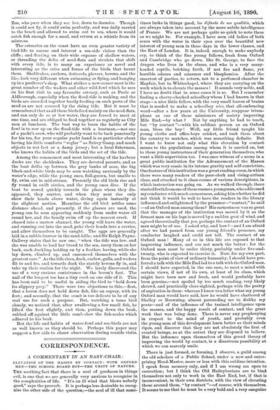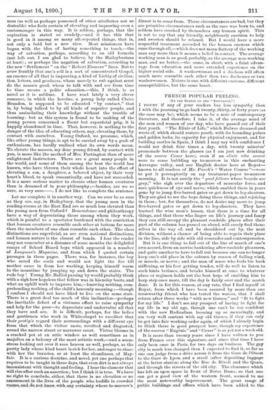CORRESPONDENCE.
A COMMENTARY IN AN EASY-CHAIR :
ELEVATION OF THE MASSES BY CONTACT: WITH OXFORD
MEN-THE SCHOOL BOARD BOY-THE UNITY OF NATURE. THE soothing fact that there is a soul of goodness in things evil, is one that we are generally very anxious to recognise in the complexities of life. "It's an ill wind that blows nobody good," says the proverb. It is perhaps less desirable to recog- nise the other side of the question,—the soul of ill that some-
times lurks in things good, les dgfauts de sex qualit4s, which are always taken into account by the more subtle intelligence of France. We are not perhaps quite so quick to note them as we might be. For example, I have seen old ladies of both sexes with the water in their eyes over the beautiful new interest of young men in these days in the lower classes, and the East of London. It is, indeed, enough to make anybody cry, to think of the fine young fellows, fresh from Oxford and Cambridge who go down, like St. George, to face the dragon who lives in the slums, and who is a very many- headed reptile, belching forth, if not fire and flame, yet horrible odours and miasmas and blasphemies. After the smartest of parties, to return, not to a perfumed chamber in Mayfair, but to Whitechapel, where they are carrying on the work which is to elevate the masses ! It sounds very noble, and I have no doubt that in some cases it is so. But I remember finding a cherry-cheeked schoolboy whom I had known in that stage—a nice little fellow, with the very small leaven of brains that is needed to make a schoolboy nice, that all-embracing word—after a few years at the University, reappear trium- phant as one of these missioners of society improving Mile End,—by what ? Not by anything he had to teach, but " by contact "—with his sublime person as an Oxford man, bless the boy ! Well, my little friend taught his young clerks and office-boys cricket, and took them about the country to matches, which was something definite. But I want to know not only what this elevation by contact means to the populations among whom it is carried on, but to these young instructors of their generation themselves, who want a little supervision too. I was once witness of a scene in a great public institution for the Advancement of the Masses which was very comic in its intense gravity and self-conviction.. One feature of this institution was a great reading-room, in which there were many readers of the poor-clerk and rising-artisan class, and attached to it class-rooms of various descriptions, in which instruction was going on. As we walked through, there startedforthfromone of theserooms a youngman, who addressed my conductor with much earnestness, asking himwhether he did not think it would be well to have the readers in the library influenced and enlightened by the presence—"contact," he said —of an Oxford man among them? His earnestness was so great that the manager of the institution was moved by it as the firmest man on his legs is moved by a sudden gust of wind, and agreed theoretically that yes, perhaps the contact of an Oxford man might be of use. I asked why, and how?—and I am afraid after we had passed from our young friend's presence, 'my conductor laughed and could not tell. The contact of an Oxford man ! Many of us in this life are exposed to that improving influence, and are not much the better : for the Oxford man must be under thirty, probably under five-and- twenty, who is expected to exercise it. Now, for my own part, from the point of view of ordinary humanity, I should have pre- ferred a talk with the Mile End lad to a talk with the Oxford man.. I should have expected, in the one case, to meet a mind with certain views, if not of its own, at least of its class, which might have been new and fresh, and would probably have been genuine,—not spoiled by too much reading, very likely shrewd, and practically clear-sighted, perhaps with the poetry of aspiration in them: whereas I know to a letter what my young Oxford man would have said, how he would have chattered of Shelley or Browning, almost . persuading me to dislike my poets—and of the influence of the trained intelligence upon the masses, and the happy result of contact, and the great work that was being done. There is never any prophesying in respect to the mind of youth, and probably even the young men of this development learn better as their minds ripen, and discover that they are not absolutely the first of created beings, as at the outset they are disposed to believe.. But the influence upon themselves of this grand theory of improving the world by contact, is a disastrous possibility at which we can scarcely smile.
There is just formed, or forming, I observe, a guild among the old scholars of a Public School, under a new and enter- prising Head-Master, more or less with this sublime intention. I speak from memory only, and if I am wrong am open to correction; but I think the Old Haileyburians are to bind themselves not only to work in the East End, but,•if that is inconvenient, in their own districts, with the view of elevating those around them, "by contact "—of course, with themselves. It seems to me that he must be a very bold and a very sanguine man (as well as perhaps possessed of other attributes not so desirable) who feels certain of elevating and improving even a costermonger in this way. It is seldom, perhaps, that the aspiration is stated so crudely,—and it has this that is good in it among so many oft-repeated things, that is, not only a bold but a new view. Most missioners have begun with the idea of having something to teach,—the way of salvation, perhaps, according to an old formula (not left out, I am glad to believe, by the Haileyburians at least) ; or perhaps the negation of salvation, according to the new " Settlement " on the " Robert Elsmere " lines. But to avow frankly that one's self is a sort of concentrated Gospel, an essence of all that is improving, a kind of Liebig of civilisa- tion, letters, and goodness, whom merely to rub against must do the masses good, whom to talk with and see from time to time means a polite education,—this, I think, is as novel as it is sublime. I have read lately a very clever romance, in which the heroine, a young lady called Claire Brandon, is supposed to be educated " by contact," that is, by being talked to by all kinds of superior people, and thus assimilating their knowledge without the trouble of learning : but as this system is found to be making of the young person concerned a fluent but superficial prig, it is happily abandoned in time. That, however, is nothing to the danger of the idea of educating others, nay, elevating them, by contact with ourselves. Young Oxford, we presume, which, like other young things, is apt to be carried away by a gush of enthusiasm, has hardly realised what its own words mean. To elevate the masses, my dear young friend, by contact with you, is more like the method of Mrs. Partington than of more enlightened instructors. There are a great many people in the world, and some of them among the best the world has known, who have thrown their whole heart into the effort of elevating a son, a daughter, a beloved object, by their very heart's blood, to speak romantically, and have not succeeded. It is a more serious matter to elevate other human creatures than is dreamed of in your philosophy ;—besides, are we so sure, so very sure—, I do not like to complete the sentence.
Let me complete it in another way. Can we ever be so sure as they are, say, in Haileybury, that the young men in the reading-rooms at the East End are so much less elevated than the young men from Oxford ? Benevolence and philanthropy have a way of depreciating those among whom they work, which is painful to a spectator burdened with the conviction that human creatures resemble each other at bottom far more than the members of one class resemble each other. The class distinctions are superficial, as are even national distinctions, and human nature is the closest of bonds. I fear the reader may not remember at a distance of some months the delightful essays of School Board boys which appeared in a number of Longman's Magazine, and from which I quoted certain passages in these pages. There was, for instance, the boy who saved the coals and would not light the fire till mother came in from her washing, keeping himself warm in the meantime by jumping up and down the stairs. The rude boy Young Mr. Balliol passing by would probably think with a sigh how hopeless that fellow was in his noisy boots, and what an uphill work to improve him,—knowing nothing, com- prehending nothing, of the child's heavenly meaning ;—though I confess I should not have liked to live on the same stair. There is a great deal too much of this inclination—perhaps the inevitable defect of a virtuous effort to raise sympathy .and help for the poor—to depreciate and undervalue all that they have and are. It is difficult, perhaps, for the ladies and gentlemen who work in Whitechapel to recollect that their proteg6s regard their surroundings with a different eye from that which the visitor casts, revolted and disgusted, round the narrow street or narrower court. Virtue blooms in a cracked pot at an attic window as well sometimes as in majolica on a balcony of the most artistic work,—and a seam- stress looking out over it sees heaven as well, perhaps, as the pretty lady whose kind heart is sick for her, and eager to share with her the luxuries, or at least the cleanliness, of May- fair. It is a, curious doctrine, and novel, yet one perhaps that requires to be taught in these days, that even dirt is not always inconsistent with thought and feeling. I hear the clamour that will rise after such an assertion ; but I think it is true. We have no right to conclude, either, that there is no elevation or no anwsement in the lives of the, people who huddle in crowded rfeipaz ap-d. do ,Rot know with any certainty 3vhere to-morn:my:a
dinner is to come from. These circumstances are bad, but they are primitive circumstances such as the race was born to, and seldom have crushed by themselves any human spirit. This is not to say that any friendly, neighbourly exertion to help and sweeten should be relaxed. But I would have a more respectful treatment accorded to the human oneness which runs through all,—which does not mean flattery of the working man any more than it means a belief in contact. The average working man is as good, probably, as the average non-working man, and no better,—the same, in short, with a faint advan- tage from education and more extended experience on the higher social side. A washerwoman and a duchess will often much more resemble each other than two duchesses or two washerwomen. Nature is one, with different customs, different susceptibilities, but the same heart.



































 Previous page
Previous page